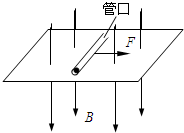问题
多选题
如图所示,匀强磁场的方向竖直向下.磁场中有光滑的水平桌面,在桌面上平放着内壁光滑、底部有带电小球的试管.试管在水平拉力F作用下向右匀速运动,带电小球能从管口处飞出.关于带电小球及其在离开试管前的运动,下列说法中正确的是( )
A.小球带负电
B.洛伦兹力对小球做正功
C.小球运动的轨迹是一条抛物线
D.维持试管匀速运动的拉力F应增大

答案
A、小球能从管口处飞出,说明小球受到指向管口洛伦兹力,根据左手定则判断,小球带正电.故A错误.
B、洛伦兹力总是与速度垂直,不做功.故B错误.
C、设管子运动速度为v1,小球垂直于管子向右的分运动是匀速直线运动.小球沿管子方向受到洛伦兹力的分力F1=qv1B,q、v1、B均不变,F1不变,则小球沿管子做匀加速直线运动.与平抛运动类似,小球运动的轨迹是一条抛物线.故C正确.
D、设小球沿管子的分速度大小为v2,则小球受到垂直管子向左的洛伦兹力的分力F2=qv2B,v2增大,则F2增大,而拉力F=F2,则F逐渐增大.故D正确.
故选CD.
